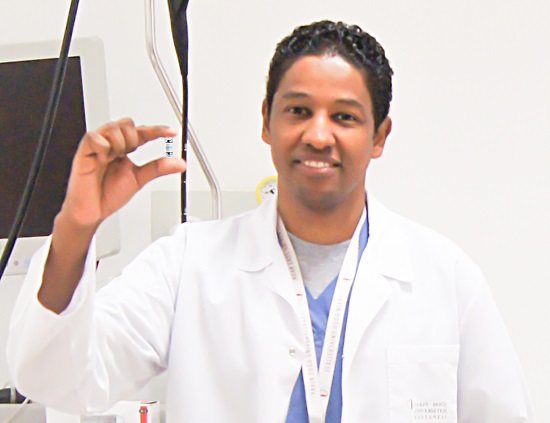
Diagnosis of intestinal diseases through using a video capsul which will end the fears of patients in endoscopy and colonoscopy applications now began at the Hospital of Near East University which closesly follows the developments and advancements in medical sciences.
Assoc. Prof. Dr. Ali İbrahim Shorbagi, specialist of gastroenterology, made a statement to Press and Public Relations Directorate of Near East University regarding the video capsule method, which is an alternative and advanced imaging and diagnosis application for diseases at the intestinal system. Assoc. Prof. Dr. Ali İbrahim Shorbagi stated that according to data published by the World Health Organization in February 2015, the intestinal type of cancers taking place amongst the top 5 cancer diseases, are from the cancer types which can be successfully treated when diagnosed early. However, due to the fear of endoscopy and colonoscopy in patients, the intestinal tumors in lower and upper gastrointestinal systems are diagnosed at late stages. The Video Capsule methods which has been put into use in recent years around the world is now providing a second but important alternative endoscopy and diagnostic methods for patients with fear of colonoscopy, and this method is expected to reduce the cancer risks significantly in colon cancer.
What is Video Capsule Method, how is it applied?
In the video capsule method, a pill size capsule with the recording device and a computer are used. Prior to the procedure, a fasting and liquid diet is applied to the patient for 12 hours, and following the diet, intestinal cleaning is carried out through the use of some drugs.
After the preparation process, a small-pill shaped camera with one wide angle lens for small bowel diagnostics, or with two wide angle lenses is swallowed with the help of a glass of water to start the imaging process throughout the digestive system. During this trip in the digestive system, the video capsule wirelessly transfers the images taken to a mobile phone size device which is attached to the waiist of the patient for 24 hours and at the end of the process, is excreted through the feces of the patient within 24 hours. While the standard capsules take two images per second, advanced capsules have access to 18 images per second, and the images received are magnified 8 times to monitor the 90% of the diseased tissue.
Who can the Video Capsule Method be applied to?
- To persons who need to undergo endoscopy and colonoscopy.
- To persons who cannot undergo anesthesia and suffer from health disorders that prevent them to undergo conventional endoscopy and colonoscopy methods.
- To persons who refuse to undergo conventional endoscopy and colonoscopy process.